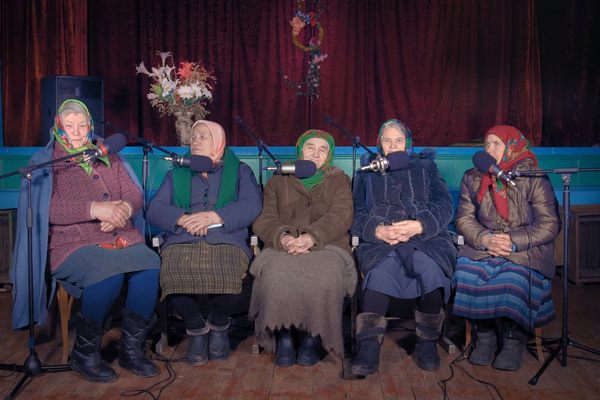Why Brazil’s State-Sponsored Brass Bands Are Constantly Playing Phil Collins
Against all odds, it’s happening around the country.

The videos all start out the same way, with a shaky, grainy image of a group of musicians in uniform. The audience coughs and shuffles their programs until the conductor makes an announcement in Portuguese. Then, the familiar strains of Phil Collins’ “Against All Odds” begin to play.
In more than a dozen YouTube videos shot all over Brazil, the song remains a bizarre constant. Whether it’s a police brass band in Minas Gerais or a youth orchestra in the city of Campo Grande, the arrangement is always the same. The only variables are just how off-key the woodwinds are, and whether the sax player struts into the audience to wild applause.
Brazil is known for its rich musical heritage, so a divorcecore ballad from the ‘80s may seem like an odd choice for a concert. Brass band performances of Bee Gees hits and the theme to Flashdance may look just as unusual to American eyes.

But public brass band performances are as firmly rooted in Brazil’s history as Jobim’s bossa nova—and so vital that the Brazilian government pays to train new musicians to carry on the tradition.
In order to figure out how those bands ended up playing Phil Collins, however, we must first start with another famous, diminutive man with a similar hairstyle: Napoleon Bonaparte.
In 1807, the Grande Armée invaded Portugal in the first act of what would become the Peninsular War. Shortly before Napoleon’s troops arrived, Portugal’s royal family fled Lisbon for Brazil—then a Portuguese colony—establishing a court-in-exile in Rio de Janeiro from 1808 to 1821. As befit a royal court in those days, a few musicians came along.
“The court eventually went back to Portugal and Brazil eventually became independent, but it sowed the seeds of military bands,” says DePaul University professor Katherine Brucher. She would know: Along with Suzel Reily, Brucher literally wrote the book on the history of brass brands in Portugal and its former colonies.
Brazil’s military bands played upbeat marches called dobrados to keep soldiers motivated during a brutal war with Paraguay that took place between 1864 and 1870.

Once the war finished, however, the army never collected its instruments. The musicians brought them home, and that’s how the tradition of municipal bands started.
“Essentially, you have a lot of men who have learned to play wind instruments, and to play in bands, and they bring this tradition back to their villages,” Brucher says.
Over the years, those bands became the accompaniment for political rallies, social events, and—most importantly—religious celebrations.
“There’s a tradition of having processions for Holy Week and for Saints Days,” Brucher says. “The music and the procession is part of the spectacle.”
Throughout the first half of the 20th century, Brazilian towns often supported two or three bands. As the number of religious festivals fell, however, the stature of brass bands eventually diminished.
“They were actually dwindling—partly because the church wasn’t having as many processions and they didn’t have as many events to perform at,” says Reily, an ethnomusicologist at the University of Campinas in Brazil.
How they rebounded—and why they’re now playing Phil Collins—is all thanks to a unique government program.

In 1976, Brazil’s national arts foundation—the Fundação Nacional de Artes, better known as Funarte—created a nationwide program to support municipal bands out of concern for the tradition of brass bands.
Called the Projecto Bandas de Música (Music Bands Project), it continues to this day with a goal of training musicians and supporting performances throughout Brazil. Today, there are 2,455 bandas playing across Brazil, with the majority in the state of Minas Gerais. Funarte has given out around 40,000 instruments in the past 40 years.
According to Funarte’s Marcelo Mavignier, the band project is also designed to reach young people in high-risk areas, with performances that benefit the musicians as well as the communities they come from.
“They usually present in public squares, theaters and auditoriums,” he says. “The target audience is the population.”
And this explains how the bandas ended up playing Phil Collins.
Instead of competing against each other, as school bands tend to do in the U.S., Brazilian bands play at friendly events called encontros, or meetings. After a day of playing old favorites and dobrados, Reily says, the bands host an evening concert to entertain the audience—and each other.
That’s when the bands show off by playing popular music, like “Against All Odds.” According to Brucher, that particular song checks a lot of boxes that would make it popular in an encontro.
“If you’re a band with a proficient saxophone soloist, it’s a big way to feature them,” Brucher says. “It’s a radio hit, it’s very melodic, it’s one of those songs—the lyrics are pretty simple, it’s really universal, and even if you didn’t speak English, you still could sing along.”
More importantly, she says, the arrangement isn’t too complicated. “The rest of the band can still play it.”

But how did that arrangement end up in the hands of so many conductors? Reily says that in the spirit of the encontro, it’s common for bands to share their work. “A new song comes up, and the band director will create an arrangement, and they pass them from one to the other.”
Mavignier says that some arrangements come directly from Funarte, while others come from the bands themselves. One of the YouTube videos attributes the “Against All Odds” arrangement to Ibanez Dutra Munhoz, whose sheet music credits a recording by the Phil Collins Big Band.
Munhoz’s arrangement was originally written for a military police band in Mato Grosso do Sul. Brucher says that isn’t surprising, as military and civilian bands trade musicians all the time. “If you come up through your community band and you’re a good musician, one of the professional avenues is to join a military band,” she says.
With all that history in mind, those grainy videos look less like weird outliers and more like a modern interpretation of a grand tradition.
“As an American, you have preconceived notions about where you would expect to hear a Phil Collins song,” Brucher says. To the bandas, however, a song’s provenance matters less than the overall performance. Musicians don’t get paid, so a successful encontro is when both the audience and the musicians have fun. Indeed, in most of the videos, you can hear the crowds singing along.
Brucher recalled an encontro she attended that paired a Russian folk song with the theme from Oklahoma!—and the crowd loved it. “They both have a good melody, so of course they go together.”










Follow us on Twitter to get the latest on the world's hidden wonders.
Like us on Facebook to get the latest on the world's hidden wonders.
Follow us on Twitter Like us on Facebook